英语史上的文化入侵对英语语言的影响
英语语言发展史
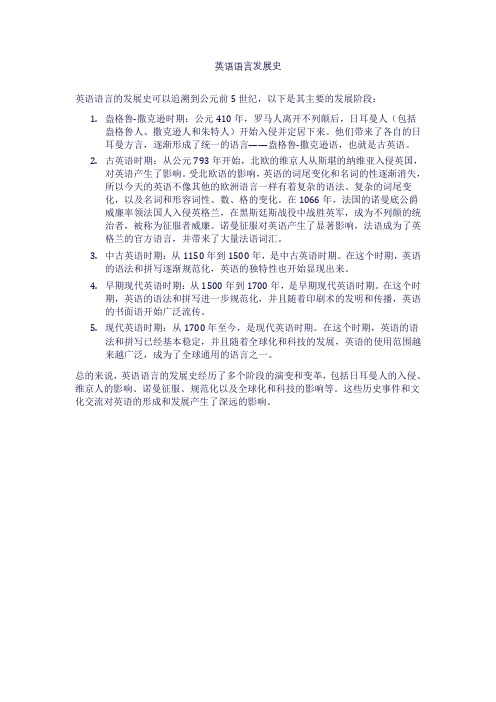
英语语言发展史英语语言的发展史可以追溯到公元前5世纪,以下是其主要的发展阶段:1.盎格鲁-撒克逊时期:公元410年,罗马人离开不列颠后,日耳曼人(包括盎格鲁人、撒克逊人和朱特人)开始入侵并定居下来。
他们带来了各自的日耳曼方言,逐渐形成了统一的语言——盎格鲁-撒克逊语,也就是古英语。
2.古英语时期:从公元793年开始,北欧的维京人从斯堪的纳维亚入侵英国,对英语产生了影响。
受北欧语的影响,英语的词尾变化和名词的性逐渐消失,所以今天的英语不像其他的欧洲语言一样有着复杂的语法、复杂的词尾变化,以及名词和形容词性、数、格的变化。
在1066年,法国的诺曼底公爵威廉率领法国人入侵英格兰,在黑斯廷斯战役中战胜英军,成为不列颠的统治者,被称为征服者威廉。
诺曼征服对英语产生了显著影响,法语成为了英格兰的官方语言,并带来了大量法语词汇。
3.中古英语时期:从1150年到1500年,是中古英语时期。
在这个时期,英语的语法和拼写逐渐规范化,英语的独特性也开始显现出来。
4.早期现代英语时期:从1500年到1700年,是早期现代英语时期。
在这个时期,英语的语法和拼写进一步规范化,并且随着印刷术的发明和传播,英语的书面语开始广泛流传。
5.现代英语时期:从1700年至今,是现代英语时期。
在这个时期,英语的语法和拼写已经基本稳定,并且随着全球化和科技的发展,英语的使用范围越来越广泛,成为了全球通用的语言之一。
总的来说,英语语言的发展史经历了多个阶段的演变和变革,包括日耳曼人的入侵、维京人的影响、诺曼征服、规范化以及全球化和科技的影响等。
这些历史事件和文化交流对英语的形成和发展产生了深远的影响。
英语外来词汇的历史分析

英语外来词汇的历史分析苏叶兰(江西科技师范学院职业技术学院外语系,江西南昌330038)摘要:英语中有许多外来词汇,究其原由与历史的发展有密切的关系,流传运用至今的英语词汇,有古时外来民族入侵时带来的,有文艺复兴时期借用到英语中的,有近代史上英帝国势力扩张带来的,随着高科技的发展,现代英语中又出现了许多技术词汇,网络词汇等。
关键词:词汇英语历史影响英语经历三个时期:古英语、中古英语,近代英语和现代英语时期。
英语词汇是由来自不同语种的外来词汇混合而成的,这种情形缘于历史上外来民族的不断入侵和英帝国的全球性扩张以及现代高科技的发展。
英语拥有庞大且覆盖面宽广的词汇,其中约有80%是外来词,这里以一个句子来说明英语外来词汇,例如:Their cups are black..在这个简单句只有4 个词,“Their”来自斯堪的那维亚语言,“black ”来自法语词,“cup”来自于拉丁语,只有“are”是来自大不列颠岛的英语。
由于讲英语的国家以及人们崇尚的是自由精神,他们对外来词汇不予于排斥,而是采取包容的态度,从而使得英语成为世界上词汇量最多最丰富的世界性语言,也是历史上独一无二的语言。
一.历史上外来民族的入侵对英语的影响1.1、凯尔特人对英语的影响大约从公元前500年开始,凯尔特人从欧洲大陆进犯,一部分人并占领了今天的英格兰的南部和东部,一部分人在今天的爱尔兰和苏格兰定居下来。
他们的语言属印欧语系,在英语词汇中只有一些地名和河流名称方面还保留着凯尔特的词汇成分。
例如the Thames ,the Cam,the Dee ,等,在Duncombe, Winchcombe, Holcome等地名中,可以看到凯尔特语cumb (=dee valley深谷)一词的成分,在Torcross , Torquay,Torrington等地名中,尚保留着凯尔特语torr (=high rock or eak;高岩或山顶)一词的成分。
英语历史上的文化入侵对英语语言的影响
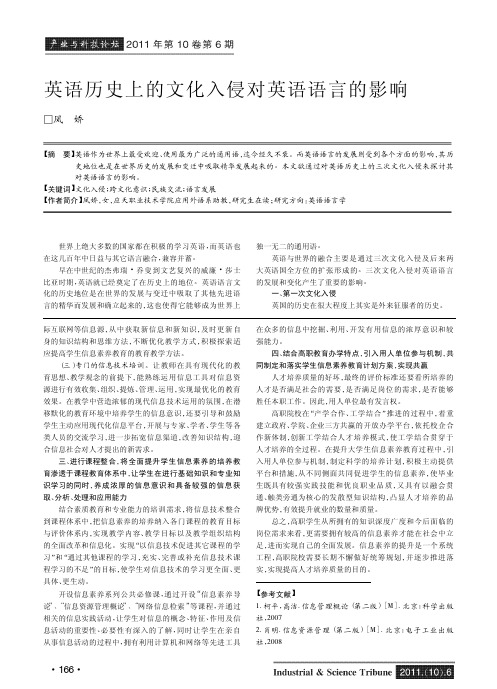
英语历史上的文化入侵对英语语言的影响□凤娇【摘要】英语作为世界上最受欢迎、使用最为广泛的通用语,迄今经久不衰。
而英语语言的发展则受到各个方面的影响,其历史地位也是在世界历史的发展和变迁中吸取精华发展起来的。
本文欲通过对英语历史上的三次文化入侵来探讨其对英语语言的影响。
【关键词】文化入侵;跨文化意识;民族交流;语言发展【作者简介】凤娇,女,应天职业技术学院应用外语系助教,研究生在读;研究方向:英语语言学世界上绝大多数的国家都在积极的学习英语,而英语也在这几百年中日益与其它语言融合,兼容并蓄。
早在中世纪的杰弗瑞·乔叟到文艺复兴的威廉·莎士比亚时期,英语就已经奠定了在历史上的地位。
英语语言文化的历史地位是在世界的发展与变迁中吸取了其他先进语言的精华而发展和确立起来的,这也使得它能够成为世界上独一无二的通用语。
英语与世界的融合主要是通过三次文化入侵及后来两大英语国全方位的扩张形成的。
三次文化入侵对英语语言的发展和变化产生了重要的影响。
一、第一次文化入侵英国的历史在很大程度上其实是外来征服者的历史。
际互联网等信息源,从中获取新信息和新知识,及时更新自身的知识结构和思维方法,不断优化教学方式,积极探索适应提高学生信息素养教育的教育教学方法。
(三)专门的信息技术培训。
让教师在具有现代化的教育思想、教学观念的前提下,能熟练运用信息工具对信息资源进行有效收集、组织、提炼、管理、运用,实现最优化的教育效果。
在教学中营造浓郁的现代信息技术运用的氛围,在潜移默化的教育环境中培养学生的信息意识,还要引导和鼓励学生主动应用现代化信息平台,开展与专家、学者、学生等各类人员的交流学习,进一步拓宽信息渠道,改善知识结构,迎合信息社会对人才提出的新需求。
三、进行课程整合,将全面提升学生信息素养的培养教育渗透于课程教育体系中,让学生在进行基础知识和专业知识学习的同时,养成浓厚的信息意识和具备较强的信息获取、分析、处理和应用能力结合素质教育和专业能力的培训需求,将信息技术整合到课程体系中,把信息素养的培养纳入各门课程的教育目标与评价体系内,实现教学内容、教学目标以及教学组织结构的全面改革和信息化。
诺曼征服对英语演变的影响

诺曼征服对英语演变的影响摘要:诺曼征服对英语的演变产生了很大的影响。
诺曼征服使得大量的法语词汇涌入英语中,包括政府、宗教、法律、社会生活等方面的用语。
而且诺曼征服对英语的句法结构、拼写也产生了一定的影响,加速了古英语向中古英语过渡的进程。
关键词:诺曼征服;法语;英语;中古英语一、历史溯源英国发展历史上有四次规模较大的文化入侵,分别是罗马征服、日耳曼征服,斯堪的纳维亚征服和诺曼征服,其中诺曼征服对英语的影响最大。
公元1066年,英王爱德华去世,因无子嗣继承皇位,英国的贵族推举了爱德华的内弟哈罗德继承王位,但法国诺曼底公爵威廉以爱德华对他早有许诺为由,发起战争夺取皇位,并在黑斯廷斯战役中打败哈罗德获胜。
这就是英国历史上的“诺曼底征服”。
诺曼人对英国的统治长达数百年之久,诺曼征服带来的法语对英语的演变产生了巨大影响。
二、语言形成阶层的界限诺曼征服之前,英格兰人使用盎格鲁撒克逊语,即古英语,属于印欧语系的西日耳曼语族。
诺曼征服后,诺曼贵族取代了盎格鲁-撒克逊贵族,诺曼主教统治了英格兰教会,英格兰的新统治者在管理中使用法语,它属于印欧语系的罗曼语族。
当时英国成为一个三语国家:法语、拉丁语和英语。
法语成为了英国统治阶级的语言;拉丁语用于宗教和教育领域;英语则主要由下层社会人民使用。
在当时能否说一口流利的法语成为衡量一个人社会地位高低的重要标准。
这种情况一直延续到1362年,英国国会第一次正式用英语开会,同年颁布了法庭辩护法令,规定一切法庭诉讼必须用英语进行,英语才逐渐恢复了它的官方地位。
三、诺曼征服对英语演变产生的影响3.1 法语借词诺曼征服后,大量的法语词汇融入到了英语中,据统计,那时有一万多法语单词被引入到英语中,其中75% 沿用至今,现代英语有50% 的单词源于法语和拉丁语,其中有一半是在诺曼征服时期借入的(侯维瑞,1995)。
特别是借入政治、法律、宗教、和社会生活方面的词。
有些借词能够反映出当时英国社会的阶级差异,典型的例子是,由下层人民饲养的家畜被称为: pig (猪), sheep (羊), bull (牛),但由诺曼贵族享用时改为法语的名称:pork(猪肉),mutton(羊肉), beef(牛肉),veal (小牛肉),这些不同的称谓可看出阶级差异。
英语词汇: 外族入侵对英语习语的影响
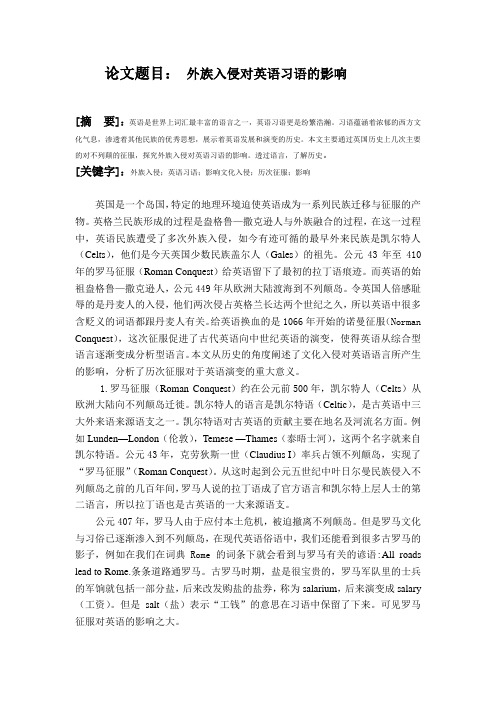
论文题目:外族入侵对英语习语的影响[摘要]:英语是世界上词汇最丰富的语言之一,英语习语更是纷繁浩瀚。
习语蕴涵着浓郁的西方文化气息,渗透着其他民族的优秀思想,展示着英语发展和演变的历史。
本文主要通过英国历史上几次主要的对不列颠的征服,探究外族入侵对英语习语的影响。
透过语言,了解历史。
[关键字]:外族入侵;英语习语;影响文化入侵;历次征服;影响英国是一个岛国,特定的地理环境迫使英语成为一系列民族迁移与征服的产物。
英格兰民族形成的过程是盎格鲁—撒克逊人与外族融合的过程,在这一过程中,英语民族遭受了多次外族入侵,如今有迹可循的最早外来民族是凯尔特人(Celts),他们是今天英国少数民族盖尔人(Gales)的祖先。
公元43年至410年的罗马征服(Roman Conquest)给英语留下了最初的拉丁语痕迹。
而英语的始祖盎格鲁—撒克逊人,公元449年从欧洲大陆渡海到不列颠岛。
令英国人倍感耻辱的是丹麦人的入侵,他们两次侵占英格兰长达两个世纪之久,所以英语中很多含贬义的词语都跟丹麦人有关。
给英语换血的是1066年开始的诺曼征服(NormanConquest),这次征服促进了古代英语向中世纪英语的演变,使得英语从综合型语言逐渐变成分析型语言。
本文从历史的角度阐述了文化入侵对英语语言所产生的影响,分析了历次征服对于英语演变的重大意义。
1.罗马征服(Roman Conquest)约在公元前500年,凯尔特人(Celts)从欧洲大陆向不列颠岛迁徙。
凯尔特人的语言是凯尔特语(Celtic),是古英语中三大外来语来源语支之一。
凯尔特语对古英语的贡献主要在地名及河流名方面。
例如Lunden—London(伦敦),Temese —Thames(泰晤士河),这两个名字就来自凯尔特语。
公元43年,克劳狄斯一世(Claudius I)率兵占领不列颠岛,实现了“罗马征服”(Roman Conquest)。
从这时起到公元五世纪中叶日尔曼民族侵入不列颠岛之前的几百年间,罗马人说的拉丁语成了官方语言和凯尔特上层人士的第二语言,所以拉丁语也是古英语的一大来源语支。
英语史上的三次文化入侵及其启示

英语史上的三次文化入侵及其启示摘要:研究语言必须联系社会发展史和创造及使用这种语言的人民的历史(赵蓉晖:2004)。
本文探讨了英语史上的三次文化入侵对英语的发展带来的深刻影响,并由此得出社会的开放和发展与语言的开放和发展相互促进的启示。
关键词:基督教会登陆不列颠岛维京人的入侵诺曼征服民族交流借词语言发展英语是当今的第一国际语言,英语在世界上占据如此重要的地位自然与英语国家的强盛分不开,而英语本身所具有的鲜明的开放性与兼容性对其在世界范围内传播也是功不可没。
英语的开放与兼容可以说是“与生俱来”的。
翻开英语史,我们可以发现在英语从古英语演变为现代英语的进程中,三次重要的文化入侵对英语今天的面貌与特质起到了甚为关键的作用。
了解这些推动英语发展的重要因素对我们更好地掌握这门语言,更好地观察分析语言现象不无帮助和启发。
1. 英语史上的三次文化入侵1.1 英语历史上的一件大事:基督教会登陆不列颠岛。
公元597年,罗马教皇格列高利一世决定派遣奥古斯丁带领传教团去不列颠岛建立教会。
传教团登陆的地点是肯特国,奥古斯丁被封为肯特国当时的首府坎特伯雷的第一大主教。
此后,罗马天主教不断扩大其组织,使英吉利成为西方基督教世界的一员。
随着基督教的兴盛,教堂、修道院大量涌现,在这些宗教殿堂以及他们创建的学校,拉丁语成为学习宗教典籍和文学的语言媒介,古希腊和古罗马的文明也通过宗教界的精英传播到不列颠,为加快其文明进程做出了卓越的贡献。
到了八世纪,英国文明引领欧洲。
基督教的到来不但对英国的历史产生重要影响,同时它也深刻地改变了英语的面貌。
首先,基督教的传播大大充实了英语的词汇。
不但有大量来自拉丁语、希腊语和希伯来语的词汇,而且还有来自遥远的东方国度印度、中国和日本的词汇和文化。
这些词汇涉及到社会生产生活的方方面面。
既有宗教的,如:abbot,alms,altar,angel,anthem,等;也有日常生活的:cap,sock,silk,purple,chest,mat,还有动植物的:camel,lion,cedar,myrrh,phoenix,rue,savory;另外还有涉及教育、文学的:school,master,grammatical,verse,meter,gloss,notary等等。
英语历史上的文化入侵对英语语言的影响

49[2013.12]【才智】【热点透视】自古英语形成之后,英语史上遭受了三次重大的文化入侵,冲击了不列颠岛的方方面面,包括语言,从而促进了古英语向中古英语的发展。
一、基督教的入侵对英语的影响公元597年,一个名为奥古斯丁的牧师从罗马来到不列颠传教。
公元7世纪,罗马教廷派来了传教士,使基督教文化在此扎根。
随之而来的一批拉丁词汇,对正在形成的古英语产生了重要影响。
基督教对英语的影响可以分为三个阶段,即大陆时期、日尔曼人入侵不列颠岛时期和基督教传入后时期。
(1)大陆时期。
公元前1世纪,罗马征服了欧洲大陆的高卢,开始与日耳曼民族有所接触。
公元5世纪,日耳曼人入侵不列颠,交往加深,从而使英语吸收了不少拉丁词汇,构成了古英语词汇中拉丁语借字的大陆时期。
(2)日耳曼人入侵不列颠岛时期。
在罗马帝国统治时期,罗马士兵与当地凯尔特居民共同生活并通婚,凯尔特人吸收了大约600个拉丁词汇。
日耳曼人侵入后,在与当地居民的交流中,日耳曼人又从中吸收了少数拉丁词汇,例如古英语:port “harbor town,港口城市”(拉丁文:portus “haven,港口”)等。
(3)基督教传入后时期。
基督教的入侵与另外两次的文化入侵最大的区别就是这是一次和平入侵,没有武力斗争。
基督教不到100年就在整个英国站稳了脚。
不仅学校教授拉丁文,法庭用语也是拉丁文,甚至许多人开始用拉丁文进行写作。
这就使得当地居民能够更系统全面地学习拉丁文。
这一时期的拉丁文借字大约有450个,其中约有100个是学术语言和文学语言,而大部分已成为古英语基本词汇的一部分。
例如古英语:Nunne “nun,修女,尼姑”;拉丁语:nonna “nun,修女,尼姑”。
基督教的入侵还带来了圣经文化,圣经中的许多人名、事件在英语中流传下来,并被后人赋予了比喻性意义和象征性意义,如:Cain 指“杀害兄弟者,杀人者”;baptism 原指“浸洗在水里,或用水泼洒在身上,表明对原罪的涤除和已被纳入教会”,现比喻“重大斗争的锻炼和考验”等。
英语语言的发展史简述
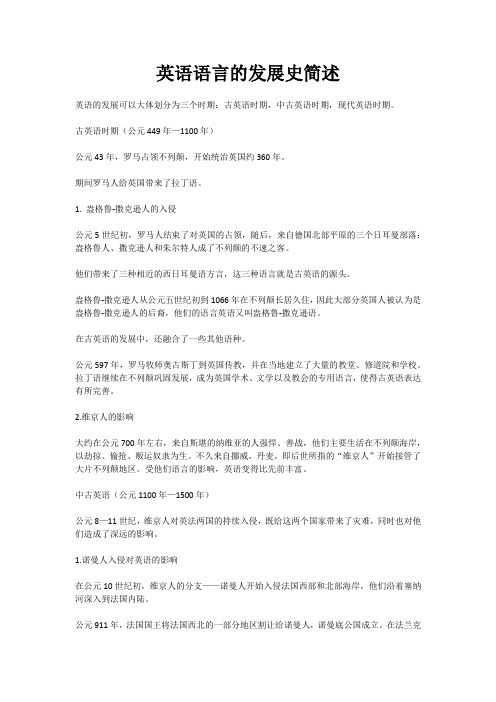
英语语言的发展史简述英语的发展可以大体划分为三个时期:古英语时期,中古英语时期,现代英语时期。
古英语时期(公元449年—1100年)公元43年,罗马占领不列颠,开始统治英国约360年。
期间罗马人给英国带来了拉丁语。
1. 盎格鲁-撒克逊人的入侵公元5世纪初,罗马人结束了对英国的占领,随后,来自德国北部平原的三个日耳曼部落:盎格鲁人、撒克逊人和朱尔特人成了不列颠的不速之客。
他们带来了三种相近的西日耳曼语方言,这三种语言就是古英语的源头。
盎格鲁-撒克逊人从公元五世纪初到1066年在不列颠长居久住,因此大部分英国人被认为是盎格鲁-撒克逊人的后裔,他们的语言英语又叫盎格鲁-撒克逊语。
在古英语的发展中,还融合了一些其他语种。
公元597年,罗马牧师奥古斯丁到英国传教,并在当地建立了大量的教堂、修道院和学校。
拉丁语继续在不列颠巩固发展,成为英国学术、文学以及教会的专用语言,使得古英语表达有所完善。
2.维京人的影响大约在公元700年左右,来自斯堪的纳维亚的人强悍、善战,他们主要生活在不列颠海岸,以劫掠、偷抢、贩运奴隶为生。
不久来自挪威,丹麦,即后世所指的“维京人”开始接管了大片不列颠地区。
受他们语言的影响,英语变得比先前丰富。
中古英语(公元1100年—1500年)公元8—11世纪,维京人对英法两国的持续入侵,既给这两个国家带来了灾难,同时也对他们造成了深远的影响。
1.诺曼人入侵对英语的影响在公元10世纪初,维京人的分支——诺曼人开始入侵法国西部和北部海岸,他们沿着塞纳河深入到法国内陆。
公元911年,法国国王将法国西北的一部分地区割让给诺曼人,诺曼底公国成立。
在法兰克优势的宗教和语言包围下,讲斯堪的纳维亚语的诺曼人自甘且迅速法国化。
他们的语言逐渐变成了法语。
公元1066年,诺曼人入侵英国,并在黑斯延斯打败当时英国国王哈罗德。
从此诺曼人开始了对英格兰的统治,也是在这个时候出现了以语言区分等级的情况。
而诺曼人的法国文明程度高于英国,法语顺势取代了英语,成为统治阶层的语言。
本土文化渗入对英语翻译教学的影响
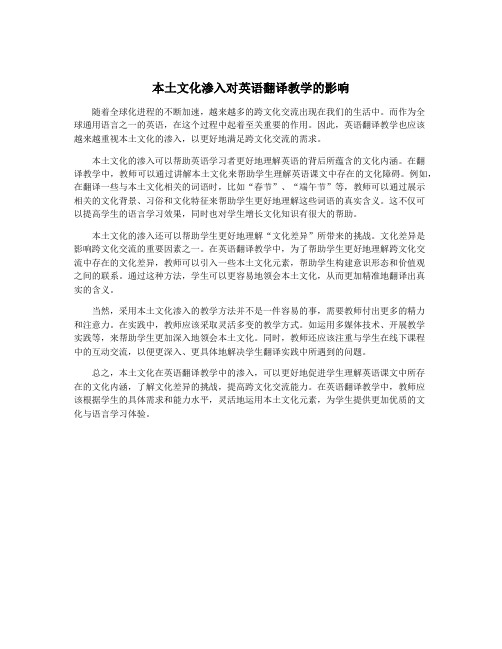
本土文化渗入对英语翻译教学的影响随着全球化进程的不断加速,越来越多的跨文化交流出现在我们的生活中。
而作为全球通用语言之一的英语,在这个过程中起着至关重要的作用。
因此,英语翻译教学也应该越来越重视本土文化的渗入,以更好地满足跨文化交流的需求。
本土文化的渗入可以帮助英语学习者更好地理解英语的背后所蕴含的文化内涵。
在翻译教学中,教师可以通过讲解本土文化来帮助学生理解英语课文中存在的文化障碍。
例如,在翻译一些与本土文化相关的词语时,比如“春节”、“端午节”等,教师可以通过展示相关的文化背景、习俗和文化特征来帮助学生更好地理解这些词语的真实含义。
这不仅可以提高学生的语言学习效果,同时也对学生增长文化知识有很大的帮助。
本土文化的渗入还可以帮助学生更好地理解“文化差异”所带来的挑战。
文化差异是影响跨文化交流的重要因素之一。
在英语翻译教学中,为了帮助学生更好地理解跨文化交流中存在的文化差异,教师可以引入一些本土文化元素,帮助学生构建意识形态和价值观之间的联系。
通过这种方法,学生可以更容易地领会本土文化,从而更加精准地翻译出真实的含义。
当然,采用本土文化渗入的教学方法并不是一件容易的事,需要教师付出更多的精力和注意力。
在实践中,教师应该采取灵活多变的教学方式。
如运用多媒体技术、开展教学实践等,来帮助学生更加深入地领会本土文化。
同时,教师还应该注重与学生在线下课程中的互动交流,以便更深入、更具体地解决学生翻译实践中所遇到的问题。
总之,本土文化在英语翻译教学中的渗入,可以更好地促进学生理解英语课文中所存在的文化内涵,了解文化差异的挑战,提高跨文化交流能力。
在英语翻译教学中,教师应该根据学生的具体需求和能力水平,灵活地运用本土文化元素,为学生提供更加优质的文化与语言学习体验。
英国殖民对英语文化的影响
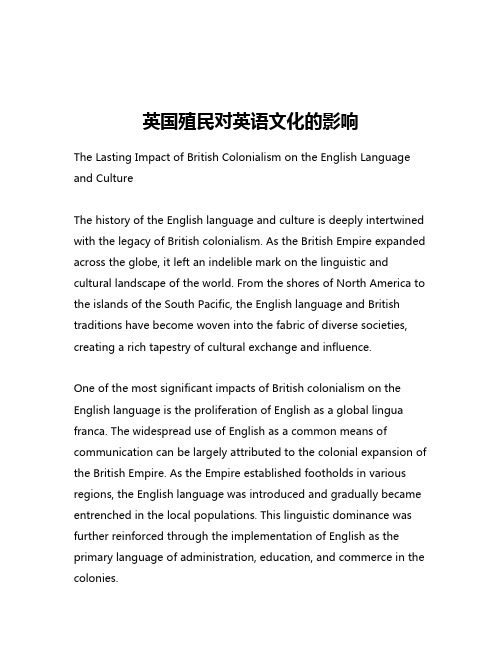
英国殖民对英语文化的影响The Lasting Impact of British Colonialism on the English Language and CultureThe history of the English language and culture is deeply intertwined with the legacy of British colonialism. As the British Empire expanded across the globe, it left an indelible mark on the linguistic and cultural landscape of the world. From the shores of North America to the islands of the South Pacific, the English language and British traditions have become woven into the fabric of diverse societies, creating a rich tapestry of cultural exchange and influence.One of the most significant impacts of British colonialism on the English language is the proliferation of English as a global lingua franca. The widespread use of English as a common means of communication can be largely attributed to the colonial expansion of the British Empire. As the Empire established footholds in various regions, the English language was introduced and gradually became entrenched in the local populations. This linguistic dominance was further reinforced through the implementation of English as the primary language of administration, education, and commerce in the colonies.The global spread of the English language has had profound implications for the evolution and diversification of the language itself. The contact between English and other languages in the colonies has given rise to the emergence of distinct varieties of English, known as "World Englishes." These regional dialects, such as Indian English, Singaporean English, or Nigerian English, have incorporated local linguistic influences, resulting in unique vocabularies, grammatical structures, and pronunciation patterns. This linguistic diversity has enriched the English language, reflecting the cultural and geographical diversity of the regions where it has taken root.Moreover, the colonial legacy has also influenced the development of English literature and the literary canon. The works of renowned British authors, such as William Shakespeare, Charles Dickens, and Jane Austen, have become integral parts of the global literary landscape, studied and celebrated across the world. However, the colonial experience has also given rise to a vibrant tradition of postcolonial literature, where writers from former colonies have reclaimed their narratives and challenged the dominant Western perspectives.Authors like Chinua Achebe, Salman Rushdie, and Ngugi wa Thiong'o have used the English language as a tool of resistance, subvertingcolonial tropes and exploring the complexities of cultural identity and the legacies of imperialism. This literary tradition has not only enriched the canon of English literature but has also contributed to a more nuanced understanding of the colonial experience and its lasting impact on the lives of individuals and communities.Furthermore, the influence of British colonialism can be seen in the enduring presence of British cultural traditions and institutions in many parts of the world. The prevalence of afternoon tea, the popularity of cricket, and the widespread use of the common law system in former colonies are all testament to the lasting impact of British cultural hegemony. These cultural elements have become integrated into the local customs and practices, creating a hybrid cultural landscape that reflects the interplay between the colonial and the indigenous.However, it is important to acknowledge that the legacy of British colonialism has also been marked by complex and often contentious histories. The exploitation of local populations, the extraction of resources, and the imposition of foreign systems of governance have all left deep scars on the societies that were subjected to colonial rule. The ongoing debates and discussions around the repatriation of cultural artifacts, the recognition of indigenous rights, and the reckoning with the historical injustices of colonialism are a testament to the continued relevance of these issues in the present day.In conclusion, the influence of British colonialism on the English language and culture is undeniable and far-reaching. The global spread of the English language, the diversification of "World Englishes," the evolution of postcolonial literature, and the enduring presence of British cultural traditions all bear witness to the profound and lasting impact of the colonial experience. While this legacy has enriched and transformed the cultural landscape of the world, it has also been a source of ongoing dialogue, reflection, and reckoning with the complex and often troubling histories of imperialism. As we navigate the contemporary global landscape, it is essential to continue to critically examine the colonial past and its continued relevance in shaping the present and the future.。
外来文化对英语词汇的影响

外来文化对英语词汇的作用与影响1With the rapid development of globalization, the influence of foreign cultures on English vocabulary has become increasingly prominent. Foreign cultures have brought both positive and negative effects to English vocabulary.On the positive side, the introduction of words from other languages has greatly enriched the English language. For instance, from Chinese, we have "kung fu" and "dim sum" entering the English vocabulary. These words not only add diversity but also provide a window for English speakers to understand different cultures. Similarly, words from French, such as "rendezvous" and "cuisine", have added elegance and sophistication to the language.However, there are also negative aspects. The excessive influx of foreign words may cause confusion and difficulties in understanding for some people. For example, when encountering unfamiliar words like "schadenfreude" from German, which means taking pleasure in others' misfortune, it might pose challenges for comprehension, especially for those who are not well-versed in multiple languages.In conclusion, while foreign cultures have undoubtedly enhanced the English vocabulary, we need to strike a balance to ensure effectivecommunication and comprehension. We should embrace the positive contributions while also being cautious of the potential obstacles they may bring.2The influence and role of foreign cultures on English vocabulary are profound and multi-faceted. The integration of words from other languages has significantly enriched the English language. Take, for instance, words like 'cuisine' from French, which has expanded the range of expressions related to cooking in English. 'Ballet', another French borrowing, has added a specific and sophisticated term for a particular form of dance.This infusion of foreign words has not only enhanced the descriptive power of English but also reflects the cultural exchanges and interactions among different nations. It showcases the openness and adaptability of the English language to incorporate elements from diverse sources.However, this phenomenon also poses challenges to the purism of the English language. Some argue that an excessive influx of foreign words might dilute the essence and integrity of the language. It could potentially lead to confusion or a loss of a distinct linguistic identity.Yet, looking at the broader picture, language evolution is an inevitable process. As the world becomes more interconnected, the borrowing of words is likely to continue. It is crucial to strike a balance between preserving the core characteristics of a language and embracing thebenefits of foreign influences. Only through such a delicate equilibrium can the English language continue to thrive and evolve in a dynamic global context.3The influence and role of foreign cultures on English vocabulary are undeniable and highly significant. Foreign words have seamlessly integrated into the English language, enriching its expressiveness and diversity. Take, for instance, words borrowed from Japanese like 'karaoke' and'sushi' which have become common in our daily conversations and are widely recognized and used. These words not only add flavor to the language but also reflect the cultural exchange and globalization.In various professional fields, the influx of foreign vocabulary is even more prominent. In the field of technology, terms such as 'Bluetooth' and 'Wi-Fi' have become integral parts of our technological lexicon. Such borrowings facilitate communication and knowledge sharing in specific domains.However, the extensive adoption of foreign words may lead to potential language confusion. Some people might not be familiar with these borrowed terms, causing misunderstandings in communication. For example, in certain specialized areas, the abundance of foreign jargon could pose barriers for those who are not experts in that field.To strike a balance, we should embrace the positive contributions offoreign cultures to English vocabulary while also being cautious of the possible confusion. We need to promote proper understanding and usage of these borrowed words to ensure effective communication and the continued evolution of the language in a harmonious way.4Throughout history and in the contemporary world, foreign cultures have played a significant and profound role in shaping the English vocabulary. The influence of foreign cultures on English words can be traced back to the ancient Roman period. During this time, many Latin words were adopted into the English language, laying a solid foundation for its development. For instance, words like "status," "data," and "bonus" originated from Latin and have become an integral part of the English lexicon.In modern times, with the rapid development of the Internet and global communication, the English language has witnessed a new wave of influence from various cultures. Words borrowed from different languages due to the popularity of online culture are constantly enriching the English vocabulary. Take the word "yoga" from Sanskrit or "sushi" from Japanese as examples. These words not only add to the diversity of English but also reflect the cultural exchanges and integration in the globalized era.The infusion of foreign words into English is not a random process but is driven by various factors. Cultural exchanges, trade, andtechnological advancements all contribute to this phenomenon. It enables English to remain dynamic and adaptive, allowing it to better express the complex and diverse concepts of the modern world. However, this also poses challenges, such as the need for learners to have a broader cultural understanding to grasp the true meanings of these borrowed words.In conclusion, the impact of foreign cultures on English vocabulary is both undeniable and far-reaching. It is a testament to the openness and inclusiveness of the English language, as well as the ever-changing nature of human communication and cultural interaction.5The impact and role of foreign cultures on English vocabulary are a complex and multi-faceted issue that demands a balanced and insightful examination. Take, for instance, words borrowed from German like 'kindergarten' and 'zeitgeist' that have seamlessly integrated into the English language. These additions have enriched the language, allowing for more precise and nuanced expressions.On one hand, the infusion of foreign words broadens the lexical repertoire of English, facilitating communication in various fields and enabling a more comprehensive description of concepts and ideas. It reflects the openness and adaptability of the language to the evolving global context.However, the influx of foreign vocabulary also poses certainchallenges. It might lead to confusion or dilution of the language's core identity if not managed properly. To maintain the vitality and stability of English, a combination of measures is necessary.Firstly, language institutions and educational systems should play a proactive role in providing clear guidelines and explanations for the usage of borrowed words. This helps learners understand the context and nuances associated with them. Secondly, efforts should be made to strike a balance between accepting new words and preserving the integrity of traditional English vocabulary.In conclusion, while foreign cultures have undoubtedly had a significant influence on English vocabulary, through careful regulation and education, we can ensure that the language continues to thrive and evolve in a positive and coherent manner.。
文化入侵的英语作文大学
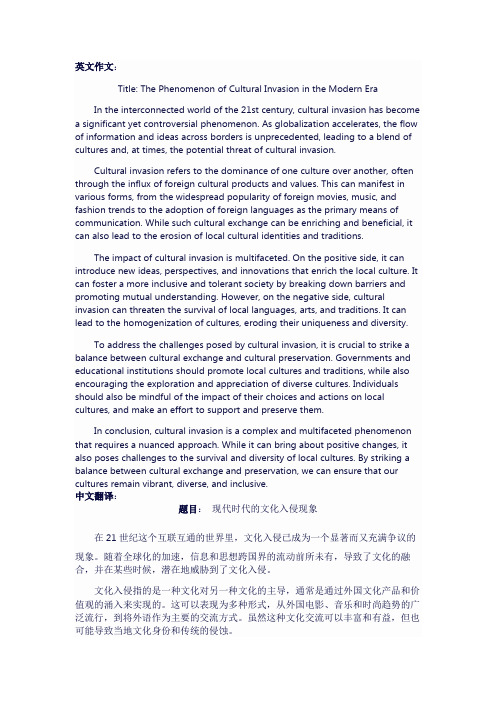
英文作文:Title: The Phenomenon of Cultural Invasion in the Modern EraIn the interconnected world of the 21st century, cultural invasion has become a significant yet controversial phenomenon. As globalization accelerates, the flow of information and ideas across borders is unprecedented, leading to a blend of cultures and, at times, the potential threat of cultural invasion.Cultural invasion refers to the dominance of one culture over another, often through the influx of foreign cultural products and values. This can manifest in various forms, from the widespread popularity of foreign movies, music, and fashion trends to the adoption of foreign languages as the primary means of communication. While such cultural exchange can be enriching and beneficial, it can also lead to the erosion of local cultural identities and traditions.The impact of cultural invasion is multifaceted. On the positive side, it can introduce new ideas, perspectives, and innovations that enrich the local culture. It can foster a more inclusive and tolerant society by breaking down barriers and promoting mutual understanding. However, on the negative side, cultural invasion can threaten the survival of local languages, arts, and traditions. It can lead to the homogenization of cultures, eroding their uniqueness and diversity.To address the challenges posed by cultural invasion, it is crucial to strike a balance between cultural exchange and cultural preservation. Governments and educational institutions should promote local cultures and traditions, while also encouraging the exploration and appreciation of diverse cultures. Individuals should also be mindful of the impact of their choices and actions on local cultures, and make an effort to support and preserve them.In conclusion, cultural invasion is a complex and multifaceted phenomenon that requires a nuanced approach. While it can bring about positive changes, it also poses challenges to the survival and diversity of local cultures. By striking a balance between cultural exchange and preservation, we can ensure that our cultures remain vibrant, diverse, and inclusive.中文翻译:题目:现代时代的文化入侵现象在21世纪这个互联互通的世界里,文化入侵已成为一个显著而又充满争议的现象。
罗马入侵对英语的影响英文版
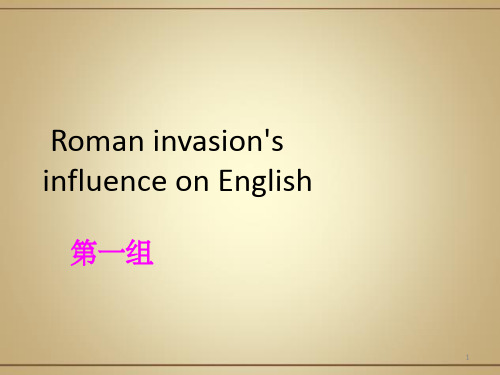
4
In the history, the real RomanConquest (Roman Conquest) is at the beginning of in 43 AD. Claudius took three years to conquer the British island in the central and southeast.As the military occupation, Roman culture and customs gradually penetrate into Britain.As the change of cultural trend, language change, Latin in British to spread rapidly, especially in the upper society, the official language, the legal terms, business terms are used such as Latin.
英国历史上的真正的罗马人的征服(Roman Conquest)是在公元43年 开始的。当时的皇帝克罗迪斯(Claudius)用了3年的时间征服了不 列颠岛的中部和东南部。随着军事的占领,罗马文化和风俗逐渐 渗入不列颠。随着文化潮流的变化,语言也随之改变,拉丁语在 不列颠到迅速传播,特别是在上层社会,官方语言,法律用语, 商业用语等都使用拉丁语。
10
本土文化渗入对英语翻译教学的影响

本土文化渗入对英语翻译教学的影响随着全球化的发展,英语已成为国际交流和商务合作的通用语言。
英语翻译教学的重要性日益凸显,而本土文化对英语翻译教学的渗入也在不断增加。
本土文化渗入对英语翻译教学的影响主要体现在以下几个方面。
本土文化渗入丰富了英语翻译教学的内容。
传统的翻译教学主要注重语言的准确翻译和句子的结构,而忽视了本土文化的因素。
英语的翻译准确性并不仅仅取决于语言的翻译,还与文化的理解和传达有关。
本土文化渗入可以引入不同国家和地区的历史、风俗、价值观等方面的内容,使学生更好地理解和传达本土文化的特点。
本土文化渗入促进了学生对跨文化沟通的培养。
英语翻译教学的目的之一是培养学生具备跨文化沟通的能力。
通过本土文化渗入,学生可以不仅仅学习语言的表达,还可以了解不同文化之间的差异和相似之处。
这有助于学生更好地进行跨文化交流和理解,提高他们的跨文化沟通能力。
本土文化渗入使英语翻译教学更加贴近实际应用。
翻译是一项实际应用的技能,需要将源语言的文化特点准确传达给目标语言的读者。
通过本土文化渗入,学生可以学习到不同国家和地区的实际运用场景,了解不同文化之间的区别,从而更好地进行实际翻译的应用。
本土文化渗入提高了英语翻译教学的趣味性和吸引力。
传统的翻译教学主要注重语法和句法的解析和应用,比较枯燥乏味。
而本土文化渗入可以将学习内容和实际应用相结合,引入实际案例和文化背景,使学习过程更有趣味性和吸引力。
这有助于提高学生的学习主动性和积极性,促进他们在英语翻译教学中的学习兴趣。
本土文化的渗入对英语翻译教学有着积极的影响。
它丰富了教学内容,培养了学生的跨文化沟通能力,使教学更贴近实际应用,提高了趣味性和吸引力。
在今后的英语翻译教学中,应加强对本土文化的渗入,促进学生全面发展。
诺曼人入侵对英语的巨大影响
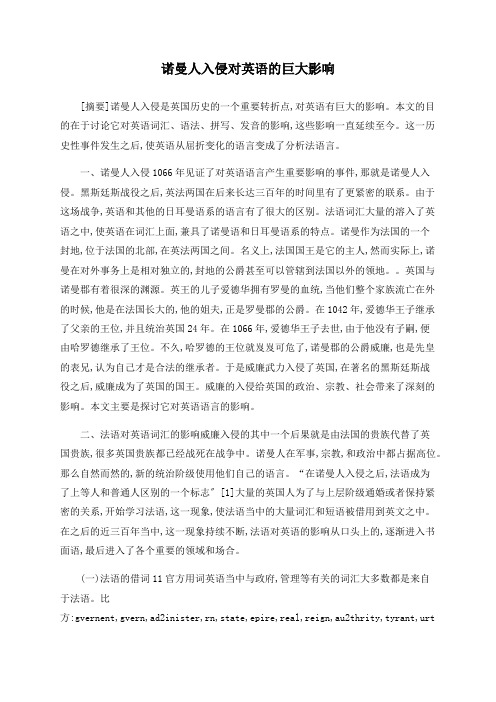
诺曼人入侵对英语的巨大影响[摘要]诺曼人入侵是英国历史的一个重要转折点,对英语有巨大的影响。
本文的目的在于讨论它对英语词汇、语法、拼写、发音的影响,这些影响一直延续至今。
这一历史性事件发生之后,使英语从屈折变化的语言变成了分析法语言。
一、诺曼人入侵1066年见证了对英语语言产生重要影响的事件,那就是诺曼人入侵。
黑斯廷斯战役之后,英法两国在后来长达三百年的时间里有了更紧密的联系。
由于这场战争,英语和其他的日耳曼语系的语言有了很大的区别。
法语词汇大量的溶入了英语之中,使英语在词汇上面,兼具了诺曼语和日耳曼语系的特点。
诺曼作为法国的一个封地,位于法国的北部,在英法两国之间。
名义上,法国国王是它的主人,然而实际上,诺曼在对外事务上是相对独立的,封地的公爵甚至可以管辖到法国以外的领地。
英国与诺曼郡有着很深的渊源。
英王的儿子爱德华拥有罗曼的血统,当他们整个家族流亡在外的时候,他是在法国长大的,他的姐夫,正是罗曼郡的公爵。
在1042年,爱德华王子继承了父亲的王位,并且统治英国24年。
在1066年,爱德华王子去世,由于他没有子嗣,便由哈罗德继承了王位。
不久,哈罗德的王位就岌岌可危了,诺曼郡的公爵威廉,也是先皇的表兄,认为自己才是合法的继承者。
于是威廉武力入侵了英国,在著名的黑斯廷斯战役之后,威廉成为了英国的国王。
威廉的入侵给英国的政治、宗教、社会带来了深刻的影响。
本文主要是探讨它对英语语言的影响。
二、法语对英语词汇的影响威廉入侵的其中一个后果就是由法国的贵族代替了英国贵族,很多英国贵族都已经战死在战争中。
诺曼人在军事,宗教,和政治中都占据高位。
那么自然而然的,新的统治阶级使用他们自己的语言。
“在诺曼人入侵之后,法语成为了上等人和普通人区别的一个标志〞[1]大量的英国人为了与上层阶级通婚或者保持紧密的关系,开始学习法语,这一现象,使法语当中的大量词汇和短语被借用到英文之中。
在之后的近三百年当中,这一现象持续不断,法语对英语的影响从口头上的,逐渐进入书面语,最后进入了各个重要的领域和场合。
浅析英语历史上文化入侵中的借词
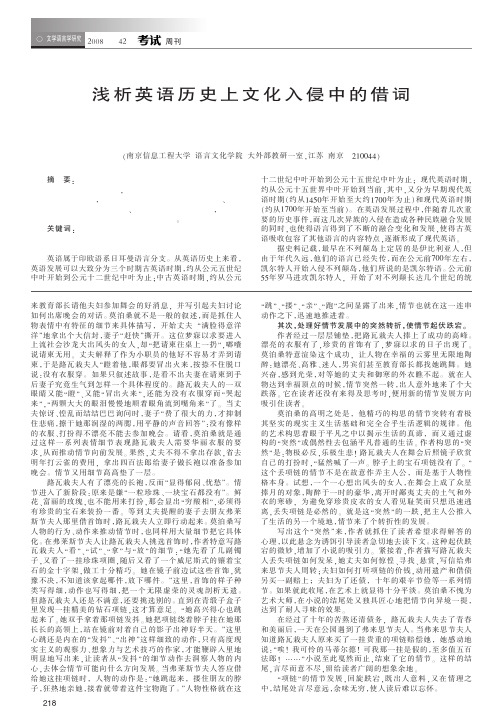
来教育部长请他夫妇参加舞会的好消息,并写引起夫妇讨论如何出席晚会的对话。
莫泊桑就不是一般的叙述,而是抓住人物表情中有特征的细节来具体描写,开始丈夫“满脸得意洋洋”地拿出个大信封,妻子“赶快”撕开。
这位梦寐以求要进入上流社会沙龙大出风头的女人,却“把请柬往桌上一扔”,嘟囔说请柬无用。
丈夫解释了作为小职员的他好不容易才弄到请柬,于是路瓦栽夫人“瞪着他,眼都要冒出火来,按捺不住脱口说:没有衣服穿。
如果只叙述故事,是看不出夫妻在请柬到手后妻子究竟生气到怎样一个具体程度的。
路瓦栽夫人的一双眼睛又能“瞪”、又能“冒出火来”,还能为没有衣服穿而“哭起来”,“两颗大大的眼泪慢慢地顺着眼角流到嘴角来”了。
当丈夫惊讶、惶乱而结结巴巴询问时,妻子“费了很大的力,才抑制住悲痛,擦干她那润湿的两腮,用平静的声音回答”:没有像样的衣服、打扮得不漂亮不能去参加晚会。
请看,莫泊桑就是通过这样一系列表情细节表现路瓦栽夫人需要华丽衣服的要求,从而推动情节向前发展。
果然,丈夫不得不拿出存款,省去明年打云雀的费用,拿出四百法郎给妻子做长袍以准备参加晚会。
情节又用细节高高垫了一层。
路瓦栽夫人有了漂亮的长袍,反而“显得郁闷、忧愁”。
情节进入了新阶段:原来是嫌“一粒珍珠、一块宝石都没有”。
鲜花、富丽的玫瑰,也不能用来打扮,那会显出“穷酸相”,必须得有珍贵的宝石来装扮一番。
等到丈夫提醒的妻子去朋友弗莱斯节夫人那里借首饰时,路瓦栽夫人立即行动起来。
莫泊桑写人物的行为、动作来推动情节时,也同样用大量细节把它具体化。
在弗莱斯节夫人让路瓦栽夫人挑选首饰时,作者特意写路瓦栽夫人“看”、“试”、“拿”与“放”的细节:“她先看了几副镯子,又看了一挂珍珠项圈,随后又看了一个威尼斯式的镶着宝石的金十字架,做工十分精巧。
她在镜子前边试这些首饰,犹豫不决,不知道该拿起哪件,放下哪件。
”这里,首饰的样子种类写得细,动作也写得细,把一个无限虚荣的灵魂剖析无遗。
但路瓦栽夫人还是不满意,还要挑选别的。
- 1、下载文档前请自行甄别文档内容的完整性,平台不提供额外的编辑、内容补充、找答案等附加服务。
- 2、"仅部分预览"的文档,不可在线预览部分如存在完整性等问题,可反馈申请退款(可完整预览的文档不适用该条件!)。
- 3、如文档侵犯您的权益,请联系客服反馈,我们会尽快为您处理(人工客服工作时间:9:00-18:30)。
“ 我 主纪 年 ” ) 。 此 种 纪 年 方法 通 用至 今。 因
普 通 的用 语 因此 使 用 最 多 , a g e 来 自法 语 ,
此 从语 言 和 文化 的 关 系角 度 来 看 , 朱特、 盎 使 用 频 率 稍次 干 t i me l 最后e p o c h 来 自拉丁
g r a mma t i c a l 等。 除此 之 外 , 现 代 英语 中 仍 和 名词 的性 逐 渐 消失 , 使 得英 语 更加 简 化 。
有与 罗马 有关 的 谚 语 :
参 考 文献 ห้องสมุดไป่ตู้
【 1 ]胡 悦 宏 . 社 会 历史 变 迁 与 英 语 的 发 展
国历史 。比德 的 纪 年方 法 以传 说 中的耶 稣 基 法 语 和 英 语 的 成 分 巧 妙 混 合 所 致 。 ” ( 陆国 到 了非 常 关 键 的作 用 。 了解 这些 推 动 英语 发 督 诞 生 之 年 为基 准 , 其 前标 为 “ B. C. ”( 意 强 , l 9 8 5 ) 。 例 如指 时 间的 词 就 有 三个 t i me , 展 的 重要 因素 对 更好 地 掌 握 这 门语 言 有 很 为基 督 诞 生 之 前 ) , 其后 标 为 “ A. D. ” ( 意 为 a g e 和e p o c h 。 其 中t i me 是 本 族 语 英语 是 最
现 四次 重要 的 文 化 入 侵 对 英 语 的 发 展 都 起
( 孤 注 一 掷 )等 。 英 语 中同义 词 、 近 义 词
交 流 的工 具 。 纵 观 整 个英 语 史 , 我 们 可 以 发 教 会史 》记 述 公元 前 5 4 年至 公元 7 3 1 年 的 英 比 较 丰 富 的 重 要 原 因 就 是 “ 由于拉丁语 、
中图分类号 : G 6 2 4
文献标识码 : A
文章编号 : 1 6 7 4 — 0 9 8 X ( 2 0 1 4 ) 1 0 ( b ) 一 0 2 3 0 — 0 1
英 语 是 现 今 的 世 界 语言 , 成 为不 同国家 这 一 时 期 著 名的 编 年史 家 , 他所著的 《 英国
1 罗马征 服 服 ( R o ma n C o n q u e s t )
侵 不 列 颠 岛, 现 在 很 多 英 国 的 地 名 和 河
格 鲁 和 撒 克 逊 这 三个 日耳 曼部 落 的 文 化 就 语, 使 用的 最少。
大 约 在 公 元前 2 世 纪 ,凯 尔 特 人 入 是 英 国文 化 的起 源 。
!
: 垫
Sci e nce an d Tech n ol ogy I nn ova t i on He r a l d
学 术 论 坛
英 语 史 上 的文 化 入 侵对 英 语 语 言 的影 响
梁清 ( 山东外国语职业学院 山东 日照
2 7 6 8 2 6 )
摘 要 : 研究语言必须联系社会发展吏和创造 及使 用这种语言的人 民的历史( 赵 蓉晖: 2 0 0 4 ) 。 因此该文从 历史和文化的角 度 阐述了罗马征服 条 埙征服 , 维京人入侵和= i 旨 曼征服对英语所产生的影响, 以期能帮助学习者更好的了 解这 门 语言。 关键 词: 文化 入侵 民族 交流 语言发展
5 结 语
英 国历史中的 四次 文化 入 侵 揭 示了语言
“
一
名 就 是 来 自他 们 所 讲 的 凯 尔 特 语 , 例 如 3 维 京 人 的入侵 ( V i k i n g C o n q u e s t ) L o n d o n( 伦敦 ) 来 自L u n d e n , Yo r k ( 约克)
迅 速传 播 。 其 中有4 0 0 多 个 拉丁 语词 汇成 为
今 天英语的基本词汇, 例如 : a nge l , S i 1 k,
Pu rPl e, Chest, n On , sch OOl , m ast er,
一
计数法: l 英尺等于1 2 英 寸, 1 先令 等 于 1 2 便 界语 言 。 而 随 着 全 球 化 的深 入 , 英 语也 将 会 士。 另 一 个 重 要 的影 响 是 英 语 的 词 尾 变 化 更加 开 放和 兼容 。
Ta me s a 。 公元4 3 年 罗 马 皇 帝 克 劳 狄 斯 一 英 语 和 文 化 注 入 了新 鲜 的血 液 。 维 京 人 的 渗入 到 日常 生活 的 世( C l a u d i u s ) 征 服 了不 列 颠 , 随 着 军 事 的 语 言 也 渐渐 被 英语 吸收 ,
,
r o o t , l o o s e , i l l , C O W, r a i s e , t a k e 等。 值 得 了包 括 拉丁 语 、 北 欧语、 法语 等外来词汇, 提 的 是 维 京 人 还 给英 国带 来 了1 2 进 位 制 词 汇 总 量 达 到 一 百 万, 成 为 名 副 其 实 的 世
来 自E o f o r wi , Th a me s( 泰晤士河 ) 来自
侵不 列 颠 岛 。这 次 入 侵 给 当时 停 滞 不 前 的
公 元7 9 3 年开 始 , 北 欧 的 维 京 人 开始 入 与社 会 文化 之 间的 互动 关 系 。 萨 丕 尔 说过 : 种 语 言 对 另 一种 语 言最 简单 的 影 响 是 词的 ‘ 借 贷’ 。 只 要 有 文化 借 贷 , 就 可能 把 有 关的词借过 来。 每 一 个 文 化 浪 潮 都 在 英 语
言 也 随 之 改 变 。因 此 拉 丁 语 在 不 列 颠 得 到
占领 , 罗马文 化 和 风 俗 逐 渐 渗 人 不 列 颠 , 语 各 个方 面 。 比如 : b a n d , b i r t h, e g g , f e l l o w 上沉 积 下一 层 借 词 。 ”正 是 这 样 , 英 语 吸 取
